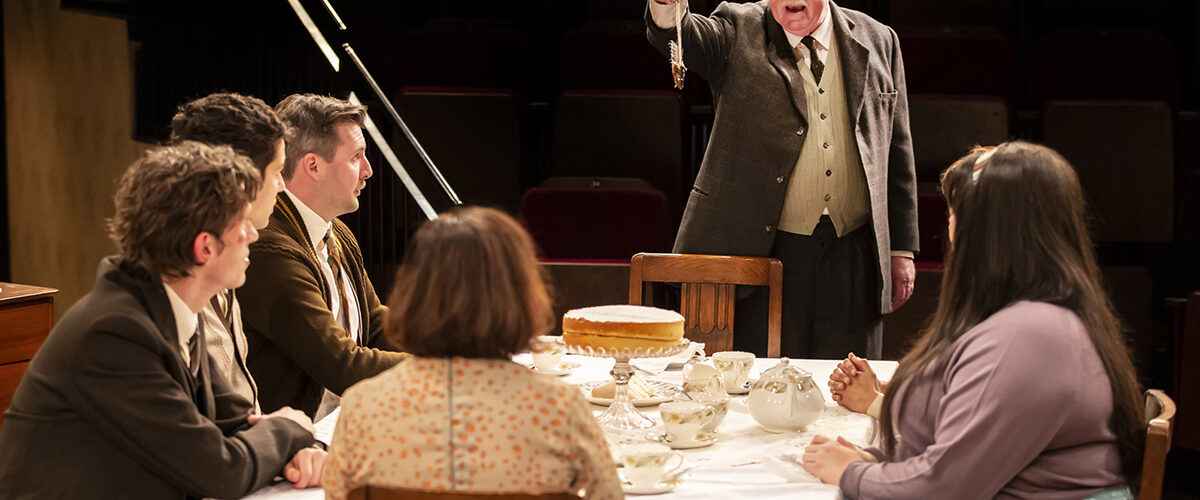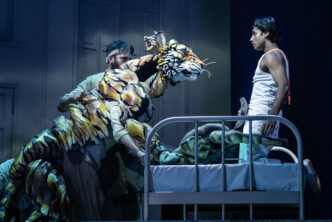Of the two generations represented in Bill Naughton’s Spring and Port Wine, the older one (the parents) have departed this world and even their children will now be in their eighties. So, much as Boltonians love their adopted son (Naughton moved to the town aged 4, from County Mayo in Ireland), any revival of his work begs the question – does this tale of a domineering father, his devoted wife, and their four adult children, have anything to say to a contemporary audience?
It’s worth noting that recent productions of famous tales of bullying dads (northern playwrights used to do a good line in them) have chosen to re-write and relocate them (culturally, more than geographically). Tanika Gupta adapted Harold Brighouse’s classic, Hobson’s Choice, presenting it as a British Asian family in the 1980s rag-trade for the Royal Exchange (2019). The Octagon itself produced a memorable reworking of Naughton’s All in Good Time (another sixties piece, often better known through the film version, The Family Way): Rafta Rafta by Ayub Khan Din.
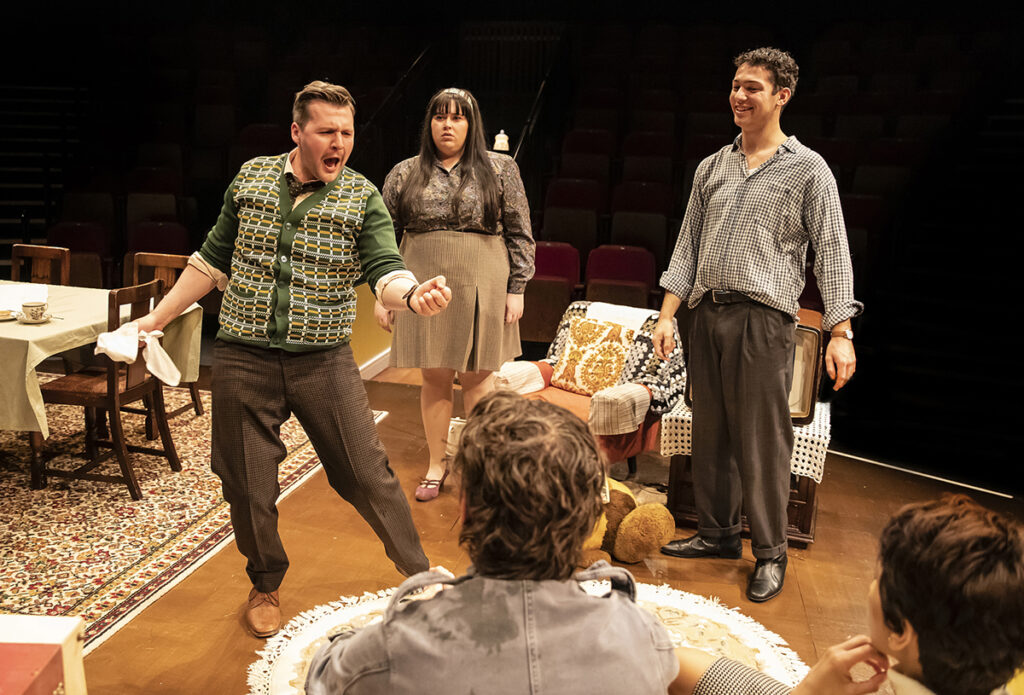
Lotte Wakeham’s new production, whilst seamlessly making use of colourblind casting, is set in 1966, and features the – decidedly Christian – Crompton family of Naughton’s original script. Does it speak to an audience, few of whom were even born when it is set?
The opening minutes do not bode well. The direction is broad stroke and the performances teeter on the brink of pantomime.
Daisy Crompton (Mina Anwar) is being badgered by her neighbour, Betsy-Jane (Isabel Ford). Betsy-Jane needs to “borrow” £5 to pay off the man who has come to repossess her television set. Bear in mind that in 1966 the average take home pay was less than £16 pw and you’ll understand the burden of this request.
At first, Daisy, who has her own money worries, says no. Betsy-Jane (who both needs and resents Mrs Crompton) departs with a few sour words about the “domineering ways” of Mr Crompton and how Daisy has no independence and thus lacks “a wife’s pride”.
Despite (or because of?) this attack, Daisy shows her mettle and the goodness of her heart by organising a chain of lending and borrowing (linking housekeeping funds with daughters and sons either subbing or borrowing from one another) so that Betsy-Jane is spared the shame of having her TV carried out in front of the neighbours (not to mention possible dire consequences when her drunken husband got home to find it gone). It’s an in-house version of what my mum used to call “robbing Peter to pay Paul.”
Talk in the Crompton house turns to when “father” will be home – a prospect none but Daisy and elder daughter, Florence (Monica Sagar) seems to relish. Elder son Harold (Charlie Ryan) smokes and affects disdain for Dad (comparing him to “the boil on the back of my neck”) but when the front door opens to signal Mr Crompton’s homecoming, panic ensues.
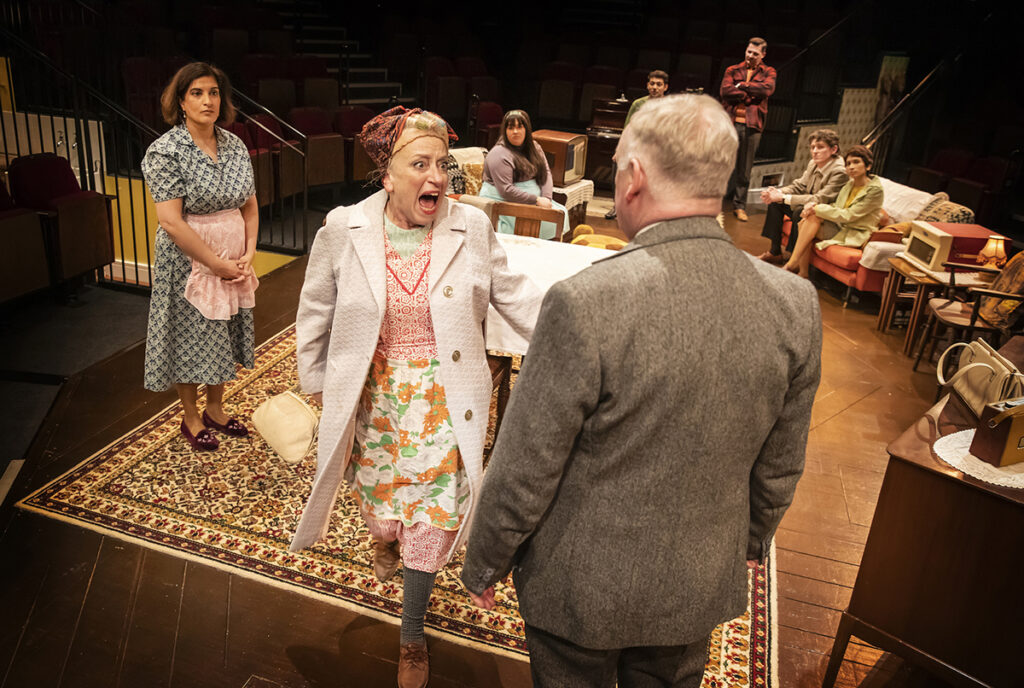
In walks Les Dennis. Those of you who know him only from light-hearted TV shows might not quake at the mention of the name, but Dennis brings a good deal of centred and layered truth to the role of Rafe Crompton. His partnership with Anwar (as his very long-suffering wife) still has room to develop, but is already a sturdy fulcrum for the show.
As the family settles down for the evening meal, we are introduced to the two props on which the main drama of the play will hang: the butter-fried herring which younger daughter, Hilda (Natalie Blair) will steadfastly refuse to eat (despite it being served up at every meal for the next few days) and the “bespoke” overcoat to which Dad has treated himself (for the princely sum of thirty two guineas).
“I never turn back when I start something.”
In what follows, Rafe will learn the costs of such a policy, whilst we shall learn the causes. Is he a bully and a tyrant, or just a father trying to do his best for his family with the limited tools at his disposal?
Does Spring and Port Wine speak to a twenty-first century audience? It’s revealing, surely, to learn (or be reminded) that the ‘generation gap’ is no new thing. When we were young, laments Rafe, parents and children “had a world in common”.
But the real (and renewed) value of the play (aside from Naughton’s fine ear for dialogue) lies in its implied warning that struggles and injustices we might have believed, only a couple of years back, were things of the past, can return to grind away at our lives and the prospects of our children.
Recent newsreel footage of a British Gas operative relishing breaking into the home of a single parent to forcibly install a pre-payment meter (in his own words, “the exciting bit” of his job), tells us that too many are no longer secure from bailiffs playing cards in one room while a mother attempts to kill herself next door.
Neither, as many of you will know, is the era of adult children living under their parents’ roof, due to financial constraints, consigned to history.

The production works best when emotions flow free (rather than being forced). It might at first seem ridiculous that a father should press his young son to swear on the Bible regarding the fate of a fried herring (there is chuckling in the auditorium), but the consequences of this brutal demand strike home powerfully.
At the interval, Naughton leaves us with the question: can that which has been torn asunder ever be put back together? It is a measure of his characterisations that we care about what the answer will be.
Anwar and Dennis are a good team who will no doubt become even stronger as the show runs. Some of the moments need clearer marking. It’s significant, for example, that Daisy goes out of her way to fund Betsy-Jane, despite being insulted by her. Give her time to react, assess and decide. It’s significant (though here played mainly for laughs) that this overbearing father cares deeply about music and poetry. And more can and should be made of the climactic moment where the truth about the new overcoat comes out – it is a defining moment for husband and wife.
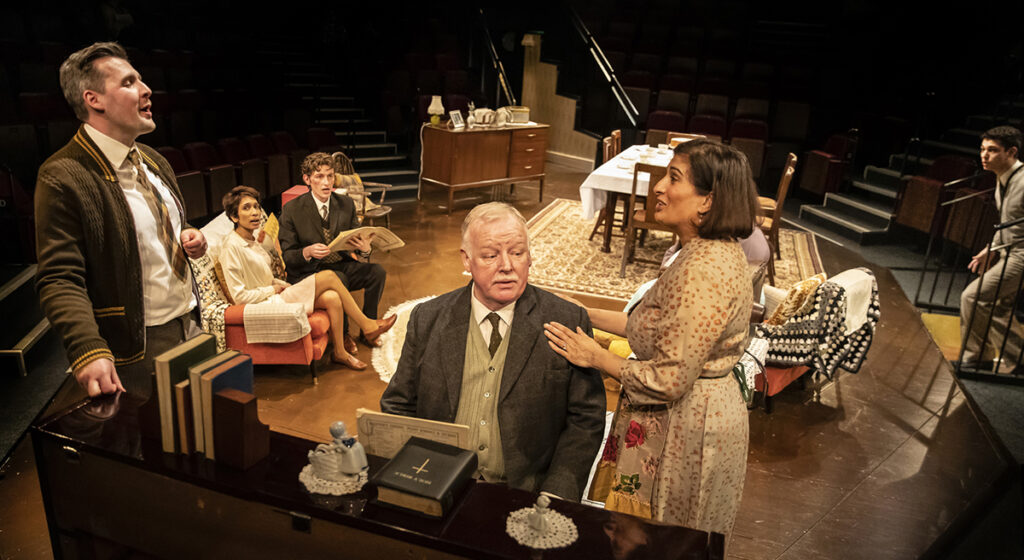
Isabel Ford is a skilled and experienced clown, but she’s also a very capable actor. Her Betsy-Jane has been given free rein with the former, but the latter could perhaps use some directorial coaxing. Those of us who grew up alongside Betsy-Janes know they carry dark secrets beneath their buffoonery and mean-spirited jibes.
The younger members of the cast perform more effectively when their amps are turned down to 9 from 11 (Spinal Tap reference). Watch and listen to the older generation, kids.
Monica Sagar as Florence – the elder daughter assiduously over-compensating for not being her father’s favourite – makes an assured professional debut. Her “farewell” to her mother is a highlight of the evening.
There’s an uplifting finale, involving music and dancing, but it might be more effectively earned. Dad’s opposition to modern musical culture isn’t really seeded in the audience’s mind. While we’re on that subject, it might have been worth pushing back the year in which this production is set. 1966 seems to have no particular relevance to the action, so why not late 1967? BBC Radio 1 launched on 30th September, 1967. What a source of inter-generational conflict that must have been!
An entertaining production that will undoubtedly get stronger as the run progresses. Support the Octagon.
Spring and Port Wine is at the Octagon Theatre, Bolton from 3 February to 4 March 2023.

